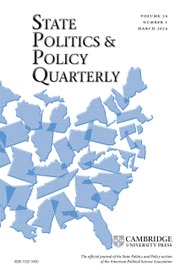Article contents
Closing Down and Cashing In: Extremism and Political Fundraising
Published online by Cambridge University Press: 25 January 2021
Abstract
Can politically polarizing events bear dividends for extremist lawmakers? Evidence from California legislative financial disclosures suggests they can. During the state's numerous budget shutdowns of the last 30 years, extremist legislators outside their party median could expect greater fund-raising hauls than their more centrist counterparts. The results suggest that polarizing events such as California's perennial budget impasses can make extremist positions more appealing to the polarized political elites who generally fund political campaigns. Regardless of the motivation, however, these results suggest a strong incentive to prolong political discord by extremists—a troubling outcome in cases where supermajority votes are required.
Keywords
- Type
- Research Article
- Information
- Copyright
- Copyright © The Author(s) 2017
References
- 4
- Cited by




